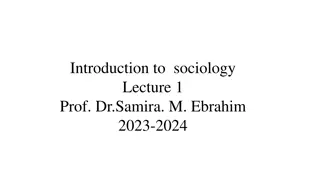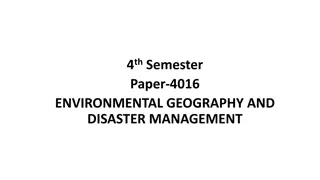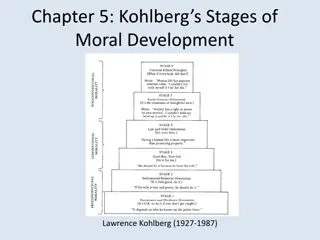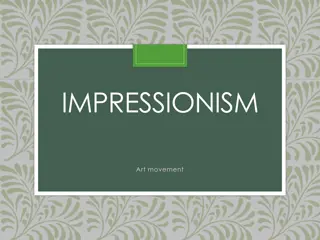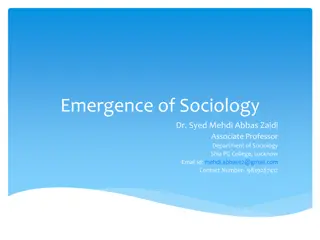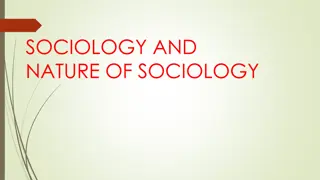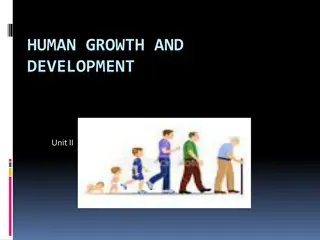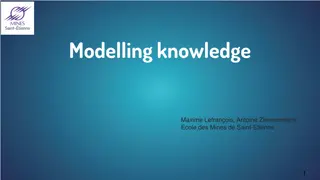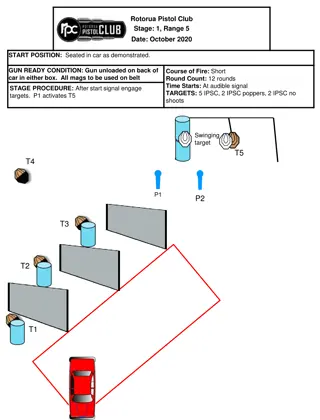Auguste Comte: Three Stages of Human Knowledge
Auguste Comte, a French philosopher born in 1798, introduced the concept of three stages of human knowledge - Theological Stage, Metaphysical Stage, and Positivistic Stage. In these stages, the progression of human understanding transitions from seeking supernatural explanations to embracing empirical research and natural laws. Comte's major work, "Cours de Philosophie Positive," delves into these philosophical concepts, highlighting the evolution of thought throughout history.
Download Presentation

Please find below an Image/Link to download the presentation.
The content on the website is provided AS IS for your information and personal use only. It may not be sold, licensed, or shared on other websites without obtaining consent from the author.If you encounter any issues during the download, it is possible that the publisher has removed the file from their server.
You are allowed to download the files provided on this website for personal or commercial use, subject to the condition that they are used lawfully. All files are the property of their respective owners.
The content on the website is provided AS IS for your information and personal use only. It may not be sold, licensed, or shared on other websites without obtaining consent from the author.
E N D
Presentation Transcript
Auguste Comte Dr. Syed Mehdi Abbas Zaidi Associate Professor Department of Sociology Shia PG College, Lucknow Email id: mehdi.abbas92@gmail.com Contact Number- 9839287412
Auguste Comte (19 January 1798- 5 September 1857) In 1798 , Auguste Comte was born in Montpelier , France His parents were middle class In 1826, he was began to concoct the Positivism philosophy scheme In 1830,he worked on the six- volume work for which he is best known , Cours de Philosophic Positive , which was finally published in its entirety in 1842.
Law of the three stages Comte identified three basic stages and proceeded to argue that the human mind, people through the maturation process, all branches of knowledge, and the history of the world all pass successively through these three stages. 1. The Theological Stage 2. The Metaphysical Stage 3. The Positivistic Stage
1. The theological Stage (before 13thCentury) In this stage ,the human mind is searching for the essential nature of things, particularly their origin(where do they come from?) and their purpose (why do they exist?). What this comes down to is the search for absolute knowledge ,it is assumed that all phenomena are created ,regulated ,and given their purposes by supernatural forces or beings(gods).
2. The Metaphysical Stage (13th-18thCentury) It is a transitional stage between the preceding theological stage and the ensuing positivistic stage. In the metaphysical stage, abstract forces replace supernatural beings as the explanation for the original causes and purposes of things in the world. Mysterious forces such as nature are invoked to explain why things are the way they are.
3. The Positivistic Stage (After 18thCentury) This is the final and most important stage in Comte s system. At this stage, people give up their vain search for original causes or purposes. people drop such non-scientific ideas as supernatural beings and mysterious forces. In this stage ,people look for the invariable natural laws that govern all phenomena the search for these laws involves both doing empirical research and theorizing. Comte differentiated between concrete and abstract laws. concrete laws must come inductively from empirical research, whereas abstract laws
Four Basic Methods of Positivism Comte explicitly identified four basic methods for sociology four basic ways of doing social research in order to gain empirical knowledge The first is the observation The second is the experiment The third is the comparison The forth is the historical research
1. Observation Observations should be directed by some theory ,and when made ,they should be connected to some law. Direction observation and indirection observation
2. Experiment This method is better suited to the other sciences than it is to sociology. It is obviously virtually impossible to interfere with, and to attempt to control, social phenomena. Direction experiment and the indirection experiment
3. Comparison Divided into three subtypes. First, we can compare humans to lower animal societies. Second, we can compare societies in different parts of the world. Third, we can compare the different stages of societies over time.
4. Historical Research Most important method in sociology. Comte wrote: necessity of historical studies as the foundation of sociological speculation.
Hierarchy of Sciences Comte's second best known theory, that of the hierarchy of the sciences, is intimately connected with the Law of Three Stages. Just as mankind progresses only through determinant stages, each successive stage building on the accomplishments of its predecessors, so scientific knowledge passes through similar stages of development. But different sciences progress at different rates. Hence astronomy, the most general and simple of all natural sciences, develops first. In time, it is followed by physics, chemistry, biology, and finally,
Continuum Each science in this series depends for its emergence on the prior developments of its predecessors in a hierarchy marked by the law of increasing complexity and decreasing generality. The social sciences, the most complex and the most dependent for their emergence on the development of all the others, are the "highest" in the hierarchy.
Reference Ritzer, George- Sociological Theory Turner J.H.- The Structure of Sociological Theory



